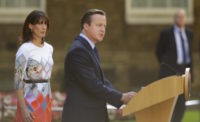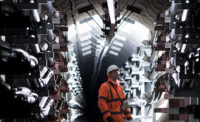Last month the leaders of Germany, France and Italy stood on the flight deck of the aircraft carrier Giuseppe Garibaldi off the shoreline of Ventotene, a tiny Neapolitan island where political prisoners detained by Mussolini during World War II first hatched the concept of a European Union. On Aug. 22, Chancellor Angela Merkel, President François Hollande and Prime Minister Matteo Renzi were there to begin the first of a set of shakedown sessions that will chart the EU’s course of action in the wake of the United Kingdom’s vote to leave the European project.
The choice for “Brexit” on June 23 was a startling event, triggering the resignation of Prime Minister David Cameron in London and rippling rudely through global markets. The two months since have seen a calming of more turbulent passions in Europe—though only slightly. Even as the new U.K. government headed by Conservative Theresa May makes overtures to Berlin and Paris and Brussels, the way forward remains unclear.
What is clear is that Brexit is buffeting large infrastructure projects, such as the proposed new nuclear reactors at Hinkley Point in the U.K. and wholesale air traffic-capacity expansion work—both freight and passenger throughput—in London. Across the continent big building firms continue to take a wait-and-see approach, although some market strategists say now is the time to get ahead of events.
“New terms covering the transfer of persons and goods between Great Britain and the EU members, as well as other countries, must be negotiated,” says Kristian Kueppers, a spokesman for Liebherr, a large Bavarian engineering services company and manufacturer of large-scale construction machines. Until these key items are decided, an intricate legal exercise that could take years, Kueppers says Liebherr won’t know exactly how Brexit will impact the industry and company.
Great Britain is one of the largest markets within the Liebherr Group. It has a subsidiary, Liebherr Great Britain, running sales and product lines in the U.K. The firm produces maritime and smaller harbor mobile cranes at Liebherr Sunderland Works, which has a 25-year pedigree. “We respect the decision of the British voters to leave the European Union,” Kueppers says. “The result of the Brexit vote could entail a period of uncertainty, however. That may have a negative impact on the investment climate in the country.”
Mixed Response and a Nuclear Plant on Hold
Liebherr’s voice is one of the more forthcoming in the industry, at least in these early days. HeidelbergCement, which recently sealed a $4.2-billion merger with Italcementi, says the potential impacts are still really unclear. Siemens, HOCHTIEF, KHL and Bosch didn’t want to speak about it—HOCHTIEF saying it’s a matter of principle. Industry sectors overall seem quite mum as of yet about the whole affair.
But some businesses are taking steps. The London Times reported that Lord Hague of Richmond, a former foreign secretary; Lord Davies of Abersoch, a former trade minister; and Sir Michael Rake, former chairman of British Telecom and the CBI (Confederation of British Industry) are joining a “Brexit client transition unit” of the lobbying and advisory consultancy Teneo. Clients including HSBC, Coca-Cola and Nissan will be heard and understood by government policymakers as the EU and Britain slowly come to terms, the Times reports, and lobbying companies expect a 40% windfall boost as a direct result of Brexit.
Directly after the Brexit vote, the value of the pound plunged, dropping more in a day than it had in decades. Perhaps, though, it had been inflated. The U.K. economic perspective is largely trained on London: on financial services and the capital’s distorted housing market. Lately, sterling has been on the rise as export orders pick up pace, and the Bank of England was able to cut interest rates, spurring private housing starts. Even so, some ₤650 million ($860 million) in commercial real estate deals have fallen through since Brexit, according to Bloomberg. In the days after the referendum, the data firm Markit reported a slowdown in construction output based on the U.K. Construction Purchasing Manager’s Index and other indicators. Construction consultancy Barbour ABI reported infrastructure contracts in the U.K. down 20% in July compared to the previous month, holding at ₤5.8 billion ($7.5 billion). On the other hand, commercial office construction and industrial building are both ticking up.
It’s difficult to tie Brexit directly to these numbers, as they are affected by a number of other factors. It could be that here the Brexit timing is coincidence and not a causal event: Analysts say it’ll take more time to tell. But sooner or later, there will be consequences on both sides of the English Channel.
“Most companies will undoubtedly be in full planning mode,” says Edgar Van der Meer, an industry analyst at NRG Expert, a consultancy and energy market researcher. “There is a lot of ‘what if.’” In wind and solar and other clean-energy sectors, the momentum is still pushed by subsidies from local governments and the EU and subject to international regulation. “European investment will likely decline, which, given the nature of the industry, will probably impact the number of future projects still in early stages of development until U.K. companies can step in,” he says. “Long-term, there may be a lull or a dip in the market which could present an opportunity for other renewable energy companies and technologies less intertwined with Europe.”
At present an energy initiative in western England is the most high-profile project to be caught up in Brexit. Within days of taking up residence at 10 Downing Street, Prime Minister May suspended the planned building of two new reactors at the Hinkley Point nuclear power station, an ₤18-billion ($24-billion) effort years in the making and a visible example of cross-border partnership. The French state utility EDF had arranged funding for the project, which includes significant funding from Chinese sources. The utility was in place to manage the building and operation of the two new reactors, which would have meant a decade of construction work and 25,000 jobs.
May announced a long-term review of the project the day after EDF locked the financing in place, reportedly due to security concerns about the Chinese. VIP tents at Hinckley Point that day meant to host executives announcing the deal came down. It didn’t look good. “EDF executives were taken completely off guard, the post-Brexit run of major investment is abruptly halted and what precious entente cordiale in Anglo-French relations there is left after the referendum result seems diminished,” wrote BBC business editor Simon Jack.
The Hinkley Point project had plenty of critics before Theresa May and had faced difficulties. The way May handled it, however, had even project critics chalking it up to bad Brexit fallout. It would not have happened that way under Cameron. “Irrespective of the merits of that case, which are at best arguable as a financial deal, it sends all the wrong messages,” says Paul Younger, a professor of energy engineering at the University of Glasgow. “The U.K. government is simply unreliable on commitments that it’s made on major energy infrastructure projects.”
Jean-Paul Mulot, former manager of the French daily Le Figaro and now an Oxford-based strategic consultant, is guardedly optimistic about the emerging lineup on both sides for Brexit negotiations (the important names there are Michel Barnier on the EU side and Julian King, the new EU commissioner for the U.K.). He’s worried about the ongoing migrant situation, especially with the long-simmering “Jungle” camp in Calais with refugees in limbo wanting to cross the channel to the U.K. The main story there is one of human struggle, but it also looms over Brexit with a threat to the transport of goods and tools. “If you are an auto manufacturer, your brakes are made in one place, other parts made in another,” Mulot says. If the parts need to cross the channel, what happens when under Brexit it starts to take much longer?
There will be opportunities as well as risks, though, says Francisco Veloso, an engineering and public policy expert with posts at Carnegie Mellon university and the Católica-Lisbon School of Business and Economics. “It means diversifying investments and assets,” he says. “If I’m based in the U.K., I would think there is an opportunity here. Things that are managed at arm’s length outside of the U.K. may have an important market in the U.K. that’s not going to disappear—and may have to ramp up some of its local activities because of the fact they can’t have the same management relationships from outside.” The U.K. is still a significant market, he adds: “No firm will want to give up on it very easily.”




Post a comment to this article
Report Abusive Comment